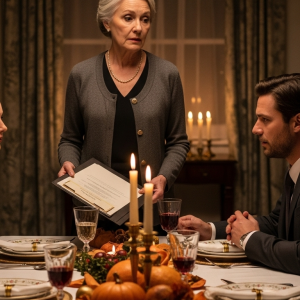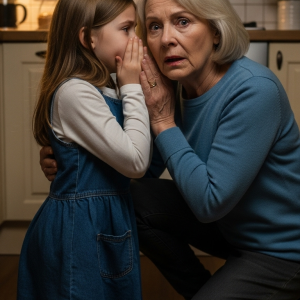The moment my son threw my suitcase onto the front porch, I knew twelve years of silence were about to become the best investment I ever made. I stood there in my good Sunday dress, watching my own flesh and blood lock me out like yesterday’s garbage. Little did they know, yesterday’s garbage was about to become worth millions.
My name is Margaret Williams, but everyone calls me Maggie. At seventy-two, I’ve learned that the only thing better than proving people wrong is making them regret ever doubting you. My son, James, and his wife, Jessica, gave me plenty to prove.
It was October 15th, 2012, when my world fell apart. I’d been living with them for three months after my husband died, helping with their two young children. I thought family was supposed to help each other through tough times.
“Mom, we need to talk,” James said that morning, his voice cold. Jessica stood behind him, arms crossed, wearing a smug expression I’d grown to hate.
“This arrangement isn’t working anymore,” Jessica announced, stepping forward. “You’re too set in your ways, Maggie. The children are confused about who’s in charge.”
I looked at James, waiting for him to defend me, to remember I was the mother who had raised him alone. He avoided my eyes like I was a stranger. “Where am I supposed to go?” I asked, my voice smaller than I intended.
“That’s not our problem anymore,” Jessica replied with a shrug that would haunt me for years. “You’re a grown woman. Figure it out.”
Twenty minutes later, my entire life fit into two suitcases and a cardboard box. Sixty years of memories reduced to what I could carry. “Don’t make this harder than it needs to be,” James mumbled as he set my bags on the porch. The taxi arrived as the first drops of rain began to fall. As we drove away, I caught a glimpse of Jessica in the window, already redecorating what had been my room. I had $847 in my purse, no job, and nowhere to live.
The Sunset Motel on Route 9 became my home. Forty-three dollars a night for a room that smelled like industrial cleaner and broken dreams. The elderly desk clerk, Mr. Patterson, took pity on me. “You’re not like our usual guests,” he said quietly. I was just hiding from the truth that my own son had discarded me.
But here’s what they didn’t count on: I’m not the kind of woman who stays down. When James was young and we had nothing, I worked three jobs to keep us afloat. Survival wasn’t new to me. I’d just forgotten how good I was at it.
The first thing I did was walk to the library every morning. At sixty, nobody was lining up to hire me, but I was looking for opportunity, not charity. During my fourth interview that week, I met Sarah Mitchell, the owner of Mitchell’s Garden Center. She had dirt under her fingernails and a no-nonsense attitude I immediately respected.
“You have experience in bookkeeping?” she asked.
“Twenty years,” I replied. “I handled all the finances for my late husband’s contracting business.” What I didn’t mention was that I’d already spotted three ways she was losing money just from sitting in her cluttered office.
“The pay isn’t much,” Sarah warned. “Fifteen dollars an hour, part-time.”
“When do I start?”
That first paycheck was $240, and I treated it like I’d won the lottery. After six weeks, I had earned enough to breathe again. My motel room slowly transformed. I bought a coffee maker and a small plant for the windowsill. If this was my life now, I was going to live it with dignity.
Three months in, I made my first real discovery. Sarah was throwing away thousands of dollars’ worth of plants each year. Anything that didn’t sell by the end of the season went to the dumpster. “It’s just how the business works,” she explained with a resigned shrug. But I saw potential.
“You want to do what with the dead plants?” Sarah asked, looking at me like I was crazy.
“They’re not dead,” I explained patiently. “They’re dormant. With a little care, most of them can be revived and resold next season.” Eight months into my new life, I had moved from the motel to a tiny studio apartment above a pizza place. The rent was steep, but it was mine. No one could kick me out.
Sarah let me take home three truckloads of “dead” plants that November, probably to teach me a lesson. My tiny apartment became a greenhouse. I researched plant care at the library, watched YouTube videos, and spent my evenings nursing brown, wilted stems back to life. By February, green shoots appeared. My studio was transforming into a jungle.
“Maggie, what the hell?” Sarah gasped when I brought the first batch back in March. “These look better than when they were new.”
“Told you they weren’t dead,” I said, trying to hide my grin. Sarah bought back every single plant for half their original price. In one transaction, I made $847, the exact amount I had in my purse the day I was thrown out. I had found my purpose.

The next year, our arrangement became official. I’d rehabilitate her unsellable plants, and we’d split the profits. By the end of year two, I was making more from my “plant hospital” than from my bookkeeping job. I had discovered that being discarded didn’t mean being worthless. Some things just needed the right care to see their potential.
Year three was when I stopped thinking small. My apartment operation was bursting at the seams, and I had a waiting list of garden centers wanting to use my service. “You need a real facility,” Sarah told me. “And you need to think bigger.” She was right, but that required money I didn’t have.
That’s when I met Eleanor Rodriguez at the Small Business Development Center. She was a sharp, efficient woman who could spot potential from a mile away. “You’re not in the plant rehabilitation business,” she told me after reviewing my numbers. “You’re in the business of turning waste into profit. That’s a completely different conversation.”
Eleanor helped me see that I was solving a major industry problem. Garden centers nationwide were throwing away millions in inventory. She helped me develop a business plan to franchise my method. The idea was terrifying and thrilling. Me, a sixty-three-year-old woman who’d been homeless three years earlier, running a national business?
The SBA loan application was forty-seven pages long. “Mrs. Williams,” the loan officer said, “your financial projections seem optimistic.”
I leaned forward. “Sir, three years ago, I was living in a motel with less than a thousand dollars to my name. Last year, I turned fifty thousand dollars’ worth of dead plants into two hundred thousand in revenue. My track record speaks for itself.”
The $150,000 loan was approved. Within six months, I had leased a warehouse, hired two employees, and established contracts with fifteen garden centers across three states. Phoenix Plant Recovery—because everything deserves a second chance—was officially born.
The irony wasn’t lost on me. My son had thrown me away, assuming I was worthless. Now I was building an empire on the very principle that nothing is, if you know how to see its potential.
By year five, Phoenix Plant Recovery was operating in twelve states, and I’d just signed a consulting contract with Home Depot’s regional headquarters. My personal net worth had crossed the seven-figure mark. I moved into a nice two-bedroom apartment and made real friends. I had a life again, one that I had built myself.
I started keeping a journal of lessons learned. The biggest one: never let anyone else define your worth. James and Jessica had decided I was a useless burden. They didn’t know they’d just given me the motivation to become everything they never imagined I could be.
The house hunting began as a practical decision and ended as an act of pure, beautiful revenge. I needed more space, but what I found was the perfect way to announce that Margaret Williams was no longer a woman anyone could throw away.
“The Harrison estate,” my realtor, Jennifer, said, “is the most prestigious address in Milbrook Heights.” Milbrook Heights—the very neighborhood James and Jessica had always dreamed of living in.
“Is it for sale?” I asked.
“Well, yes, but the asking price is four-point-two million dollars.”
“Let’s take a look,” I said.
The estate was a twelve-thousand-square-foot mansion on eight acres of manicured grounds. It had a library, a chef’s kitchen, and a conservatory. But what really sold me was the view from the master bedroom. You could see the entire town spread out below, including the modest neighborhood where James and Jessica lived. Every morning, I could wake up and literally look down on the people who had looked down on me.
“Cash offer,” I said without hesitation. “Three-point-eight million. Close in two weeks.”
Jennifer nearly dropped her briefcase. The sellers accepted in six hours. Two weeks later, I stood in the grand foyer, holding the keys, trying not to laugh at the absurdity of it all. Six years earlier, I’d been sleeping in a motel. Now I owned the most expensive house in the county.
My first evening, I sat on the massive back deck, watching the sunset. My phone buzzed with a text from Eleanor: Saw the real estate transfer in the paper. You magnificent woman. I smiled. Some beginnings require endings. And I had a feeling the ending to my relationship with James and Jessica was about to become very, very interesting.
The doorbell rang at 9:17 a.m. on a Saturday, exactly twenty-four hours after the real estate transfer hit the paper. Through the security monitor, I saw them. James, looking older and grayer. Jessica, in designer jeans that probably cost more than my first month’s rent above the pizza place. Behind them were two teenagers I barely recognized—my grandchildren, Emma and Tony. Six years of silence, and they show up the day they discover I’m rich.
“Well, well,” I said, opening the door but not the screen. “To what do I owe this unexpected pleasure?”
“Mom,” James’s voice cracked. “We read about the house. We wanted to congratulate you.”
“Congratulations delivered,” I said flatly. “Anything else?”
Jessica stepped forward with a bright, fake smile. “Maggie, we know things ended badly. We realize we handled everything wrong.”
“Handled everything wrong,” I repeated slowly. “Is that what we’re calling it?”
“We’re family, Maggie,” she pressed, gesturing vaguely at the mansion behind me. “And family should stick together, especially when there’s room for everyone.” There it was. The real reason.
I finally stepped back. “Why don’t you come in?” I led them into the living room, with its floor-to-ceiling windows, and watched their faces as they took in the silk wallpaper and priceless art. “This place is incredible,” Tony breathed.
“Much too big for one person,” Jessica said carefully.
“Is it?” I settled into my favorite armchair. “I find I quite like having space to breathe.”
James sat on the edge of the sofa. “Mom, about what happened… we were under a lot of stress.”
“So, naturally, the solution was to make your widowed mother homeless,” I finished. “Very logical.”
Jessica got agitated. “This is ancient history, Maggie. We’re trying to move forward.”
“No,” I interrupted. “You’re trying to rebuild your bank account. There’s a difference.”
“Fine,” Jessica snapped, her patience gone. “Yes, we need help. James lost his job three months ago. We’re behind on the mortgage, and Emma needs money for college applications. Happy now?”
“Deliriously,” I said dryly. “Now we’re getting somewhere.”
“We were thinking,” James jumped in, “you have all this space…”
“You want to move in,” I stated. It wasn’t a question.
“Temporarily,” Jessica added quickly. “Just until James finds another position.”
I looked at the people who had discarded me the moment I became inconvenient. Then I looked at the two teenagers, my grandchildren, who had been robbed of knowing me. “Sit down,” I told them. “It’s time you learned exactly what kind of people your parents really are.”
I told them everything, my voice calm and factual. The motel. The part-time job. The social security checks I’d given their parents. The two suitcases on the porch. Emma and Tony listened, their faces serious.
Tony looked confused. “But Dad, you told us Grandma Maggie moved to Florida. You said she didn’t want to see us anymore.”
“Yes, you did,” Emma jumped in, her voice rising. “You made us think she abandoned us.”
The vindication was mixed with a deep sadness for these children. I pulled out my phone. “I know things, James. I know you were fired six months ago for falsifying expense reports. I know you’re facing foreclosure next month.” James’s face went white.
Then I showed them a photo of a letter James had written me six years ago, after a drunken, tearful visit to my apartment, begging me to come back and admitting he had made a terrible mistake. The last paragraph was the most damning: he begged me not to tell Jessica, because she had threatened to leave him if he tried to bring me back.
Emma was crying openly now. “Six years,” she whispered. “We missed six years with you because of their lies.”
“This is ridiculous,” Jessica snapped. “We’re your family, Maggie. You can’t just pick and choose.”
“Watch me,” I replied calmly.
“Fine,” she said. “We’ll just leave. Come on, kids.” But Emma and Tony didn’t move.
“Actually,” Emma said quietly, “I want to stay and talk to Grandma Maggie. Alone.” Tony nodded.
“I am not keeping anyone from anyone,” I said, looking at James and Jessica. “But Emma and Tony are welcome here anytime. You two are not. Not until you’ve proven you’ve changed.”
“Proven how?” James asked, his voice defeated.
“Start by telling your children the complete truth. Then, get your financial house in order without my help. Show me you can stand on your own two feet. Then, maybe, we can have a conversation about forgiveness. Maybe.”
After they left, I sat with my grandchildren for two hours, answering their questions and beginning the long process of catching up. As I watched them leave, I felt a deep, profound satisfaction. The people who had thrown me away were now begging for scraps, while the woman they discarded was living in a world they could only dream of. I had proven that being thrown away doesn’t mean you’re worthless. Sometimes, it just means you’re finally free.




